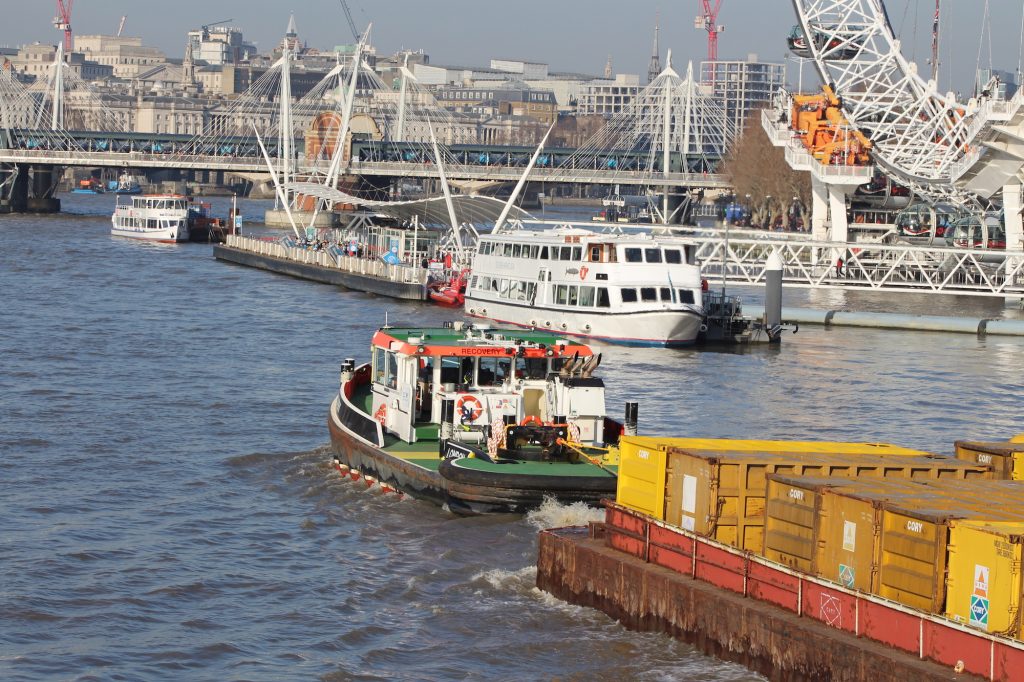Further reminiscences of a longtime Waterman and Lighterman of the Thames
Over the past weeks of lockdown, I have had the chance to discover more about Eric Carpenter’s wide-ranging work along the Thames. It seemed from our initial meeting and following email exchanges that he held his time with Cory in particular affection. From 1984 until his retirement in 2008 Eric was employed by Cory Waste Management based at Charlton.
He joined the tug RECRUIT and clearly bonded with the crew “who were all principled men, who pulled their weight and could be relied upon.” One day he was asked by “a good friend to join a crew on another tug, the GENERAL VII, based at Gravesend” but he was happy where he was, sailing upstream through the bridges to the London wharves every shift.” He remembers the tragic sinking of the GENERAL VII a while later, after a collision with a ship adjacent to Tilbury Dock Lock, with the loss of the lives of his friend Colin Baker, and three other members of the crew. Those who work on the river have to be constantly aware of the dangers and safety is of prime importance.
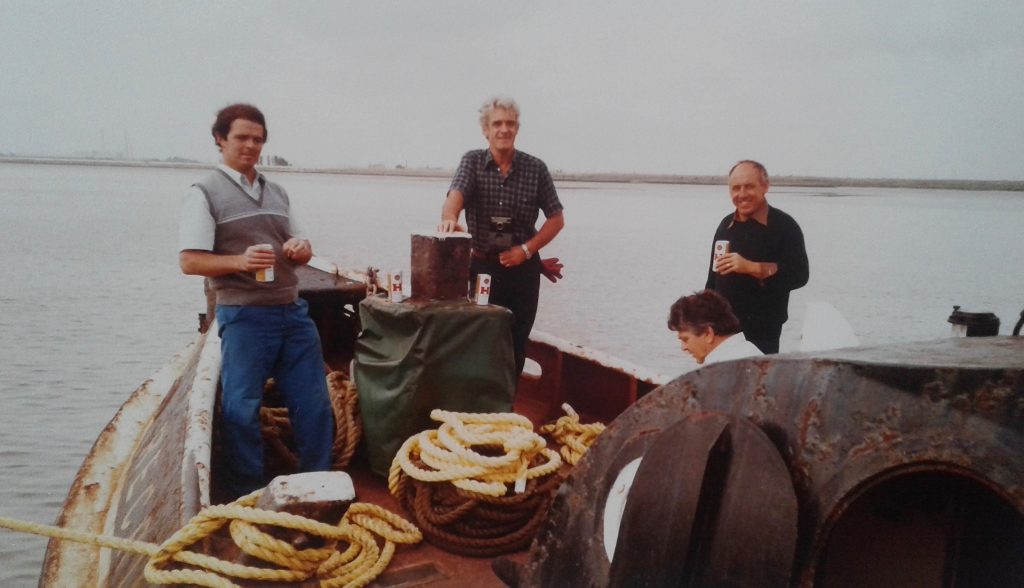
waiting for the tide to rise. ©Eric Carpenter
Eric describes life and camaraderie on board the RECRUIT. “Summertime was pleasant towing up through the bridges, returning down with the bridges illuminated on a summer’s night. But, as any Waterman will tell you, it is totally different in the winter months, coping with the wind and the rain, dropping light barges and picking up the loaded ones is not a bundle of laughs.” However, smiling, he continues, “The highlight of the shift was lunch, or as we called it dinner. It could be two chickens (rooster boosted), roast potatoes – my speciality, par boiled and given a good shaking to rough up the outsides, making them crunchy when cooked – or a leg of lamb, a piece of beef and all the trimmings. Nothing got thrown away. We had our mishaps though: the chicken falling out of the oven when the tug nudged the barges; the day we tried to make Yorkshire pudding and it turned out like an inch thick rubber mat. One day the designated cook for that shift wanted to add a sprinkling of pepper to the mashed potatoes but the top came off the pepper pot and everything went into the mash. But it was all eaten anyway.” Fellow crew members at that time were: Jackie Franklin, Gerry Musset, Tommy Lewthwaite and Eric Everest. They trusted and relied on each other and became good friends.
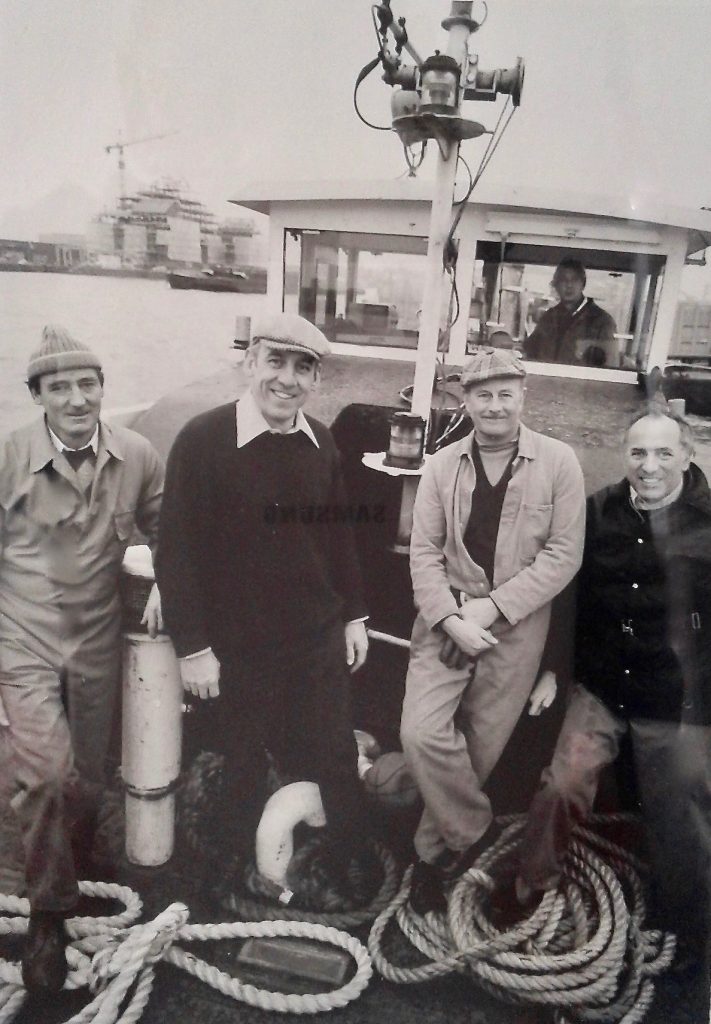
From the left: Jackie Franklin, Eric, Tommy Lewthwaite and Gerry Musset. ©Eric Carpenter
From 1992 to 2008 Eric transferred from the RECRUIT to become a ‘Mucking Boatswain’. All the barges loaded at London’s refuse stations headed to Mucking jetty, where there was a major landfill site, now transformed into the Thurrock Thameside Nature Park. Eric explains that “the site was equipped with three container cranes that unloaded the containers to be taken to the landfill site, emptied and returned to the barges. As the jetty received all the barges from London it was imperative that there was twenty-four hour cover.” Operating there wasn’t simple as “the exposed position of the wharf in the Thames estuary, made it vulnerable to delays caused by bad weather, specifically fog and wind. If the tug missed the daytime tide it would have to bring the barges ashore on the next high tide.”
And the tides were a further complication as the location of Mucking jetty meant that the barges were only afloat for roughly four hours. “This made the shifting of the craft quite hectic, also there was not much run in the tide, so the wind direction was more of a consideration.”
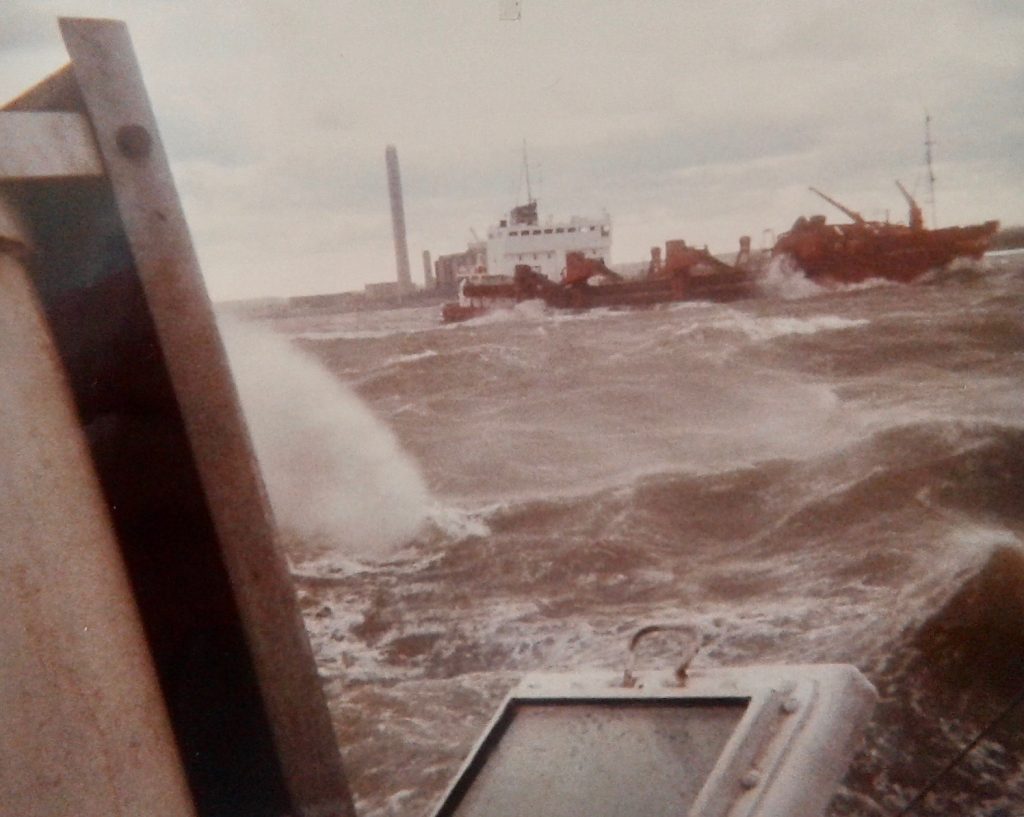
Eric’s responsibilities as a boatswain, along with two others of equal rank, were to “do a safety check of the jetty, checking lifebuoys, the ‘eyes’ of the mooring ropes, safety railings, the capstan ropes, and the access ladders to the barges.” They had to liaise with the tug captains via V.H.F. radio, the operations manager at head office and the jetty manager, in order to arrange and assemble the tows, which could vary in the number and size of barges from one tide to another. But it was not without difficulty. “It was fairly straightforward in the summer months when it was daylight and the weather was calm, not so easy at 2.00 am in the winter with the wind blowing from the east at force 5 !”
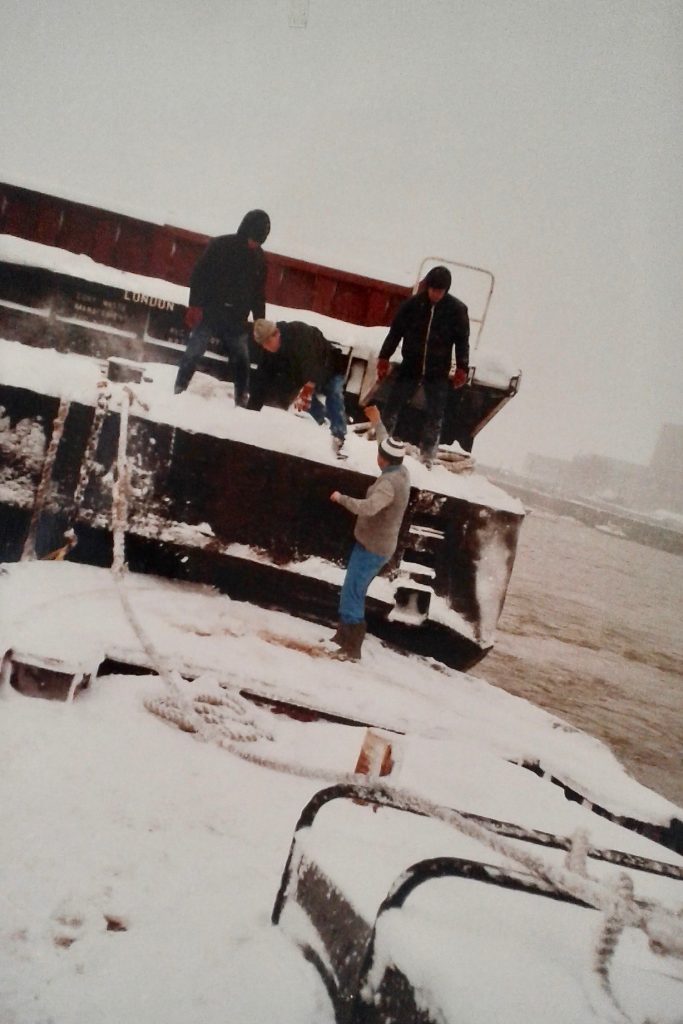
Eric describes his last working day, “It was a normal shift. I remember the tug pulling the tow off for the last time and feeling nostalgic. As we were finishing mooring up, I noticed the tug coming back ashore ‘light boat’, that is not towing. As they approached the jetty I saw that the whole crew were on deck: they had come to say their final farewells and to wish me luck. Gary Anness, the captain, then presented me with a bottle of something special!” Eric adds that he was “fortunate to work with two fine tug captains during my time at Mucking, Tim Keetch and Gary Anness, honourable men who could be relied upon.” He also remembers with affection Tom Huggins, Mike Trowbridge, Bill Cook and ‘Buzz’ Bullock, colleagues who became friends.
The Thames is certainly part of Eric’s DNA. His father was a “Journeyman” Lighterman, who as his son was to do, worked all along the river and, as a young teenager, Eric used to bike down to the Woolwich ferry with friends and ride back and forth across the river because it was free. He enjoyed his career on the Thames but doesn’t over romanticise it. Things could be physically and mentally tough and he was always aware of, and concerned about, the need for safety. Working on the river can be dangerous.
He ends his reminiscences by saying that “Although August 24, 2008 was my last day working as a Waterman and Lighterman, I shall be a Waterman and Lighterman till I die.” The love he had, and still has for his profession is clearly expressed when he adds: “I was fortunate to work on the river when I did. I worked from Isleworth in the west to Holehaven Creek in the east, and along every creek and canal adjoining the river Thames. I did not simply work on the river for fifty years, I had an adventure on the river for fifty years!” It was an ‘adventure’ that brought him much satisfaction and sense of fulfilment. He ends by saying: “I would urge any young person to embrace the job and, when they are going ‘up through’ and see office workers scurrying across the bridges to ‘push their pens, or tap their keyboards’ in some confined or crowded office, they should thank their lucky stars it is not them.”
END NOTE
With grateful thanks to Eric Carpenter for sharing his photos and for sparing me the time to tell his story and something of his expert knowledge of our constant, yet ever-changing river Thames.
Click here to discover more about the history of Thames Watermen and Lightermen
